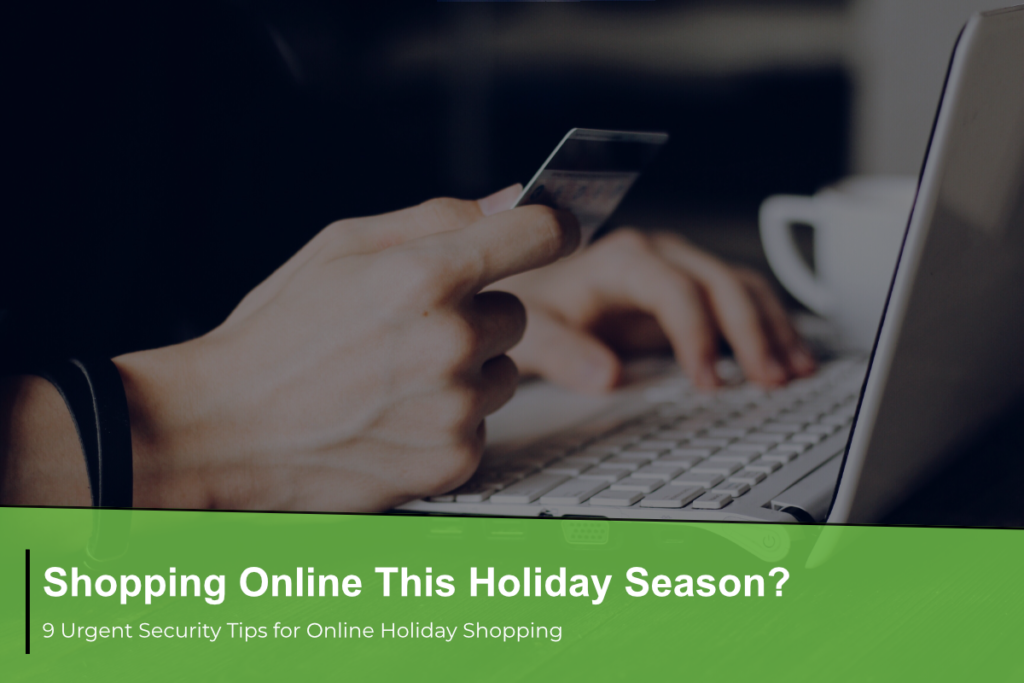The holiday shopping season is in full swing. As a result, scammers have also gotten into gear. With all those online transactions, they’re ready to take advantage.
Stay safe online during the holiday buying frenzy. Prevention is definitely better than cure when it comes to cyber security. In addition to saving you from financial or privacy problems, it can help you avoid a lot of problems.
Here are some safety tips to keep you safe while shopping online this holiday season.
Before you shop, check your device for updates
Older computers, tablets, and smartphones are vulnerable. In spite of the fact that you may not want to wait through a 10-minute iPhone update, you will be more secure if you do.
It is common for hackers to exploit vulnerabilities found in device operating systems. Patches for known vulnerabilities are installed during updates, reducing your risk. If you are shopping online for the holidays, make sure all updates are installed on your device.
Don’t click on email links to visit websites
It’s annoying to have to type in “amazon.com” rather than simply clicking a link in an email. This time of year, phishing scams are at an all-time high. Malware can be automatically downloaded if you click on a link in an email to a malicious site.
Visit the website directly instead of clicking links. You can save sites as shopping bookmarks in your browser to make things easier. It’s safer than clicking a link in an email or text message.
Consider using an app wallet whenever possible
Giving your debit or credit card to a website is always a risk. Doing holiday shopping on a site you haven’t used before increases the risk.
Use a wallet app or PayPal whenever possible. As a result, you don’t have to provide the merchant with your payment card details directly. They are instead shared with the wallet app service (Apple Pay, Google Pay, PayPal, etc.). The retailer does not receive them.
After checking out, remove any saved payment cards
Many websites (including Amazon) automatically save your payment card information. This is a bad thing. Although it may make the next purchase more convenient, it also puts your safety at risk. If a hacker gains access to your device or account, purchases could be made.
The retailer may also suffer a data breach. These are common and can expose sensitive customer payment information. Keeping your payment details in fewer databases is better for your security.
Remove your payment card from the site as soon as you have checked out. This can usually be done in your account settings.
Ensure the site is HTTPS-encrypted
Nowadays, HTTPS is the standard for most websites. The HTTPS protocol encrypts data transmitted through a website. Details such as your name, address, and payment method.
Never shop on a website without HTTPS in the address bar. An additional indication is a small lock icon in the address bar of the website.
Make sure the URL of the site is correct
Typos happen to everyone from time to time. This is especially true when typing on a small smartphone screen. You can end up on a copycat site if you make a typo (such as Amazonn(dot)com).
Hackers buy popular retailer domains that look similar to the real ones. They then create copycat sites that are designed to fool users who typed the URL incorrectly.
Take a moment to double-check that you’ve landed on the right site. Make sure you do this before you start shopping.
Online shopping should never be done on public WiFi
If you connect your device to public WiFi, you might as well expect someone to stalk you. During the holiday shopping season, hackers enjoy hanging out at popular public Wi-Fi spots.
It is possible to spy on the activities of other devices connected to the same free hotspot. As a result, everything you type can be obtained by them. Passwords and credit card numbers, for example.
If you’re connected to a public Wi-Fi network, never shop online. Switch off WiFi and use your mobile carrier’s connection instead.
Beware of brand impersonation emails and texts
In 2021, phishing scammers were very active during the holiday shopping season. Phishing-related typo-squatting domains increased by 397%.
Phishing is a problem all the time, but it’s even more dangerous during the holidays. The attackers know that people are expecting retailer holiday sales emails. It’s also a busy time of year for order confirmations and shipping notices.
These emails are used as templates by hackers. They impersonate brands like Target, UPS, and Amazon. Their emails look almost identical to the real thing. Their goal is to trick you into clicking on a malicious website and/or logging in.
Keep an eye out for emails impersonating brands. It is always better to go directly to a site rather than through an email link.
Check Your Account & Enable Banking Alerts
Keep an eye on your bank account regularly to avoid phishing attacks. Be on the lookout for any suspicious charges that may indicate a breach. Setting up banking alerts through your online banking app is one way to automate a monitoring process.
Banks, for example, allow you to set up alerts for events such as:
- When a purchase exceeds a specified amount
- When an overseas purchase is made
Do You Know How Secure Your Mobile Device Is?
Holiday shopping scams often use mobile malware. Do you know how secure your device is from malicious apps and malware? For a security checkup, contact us today.

